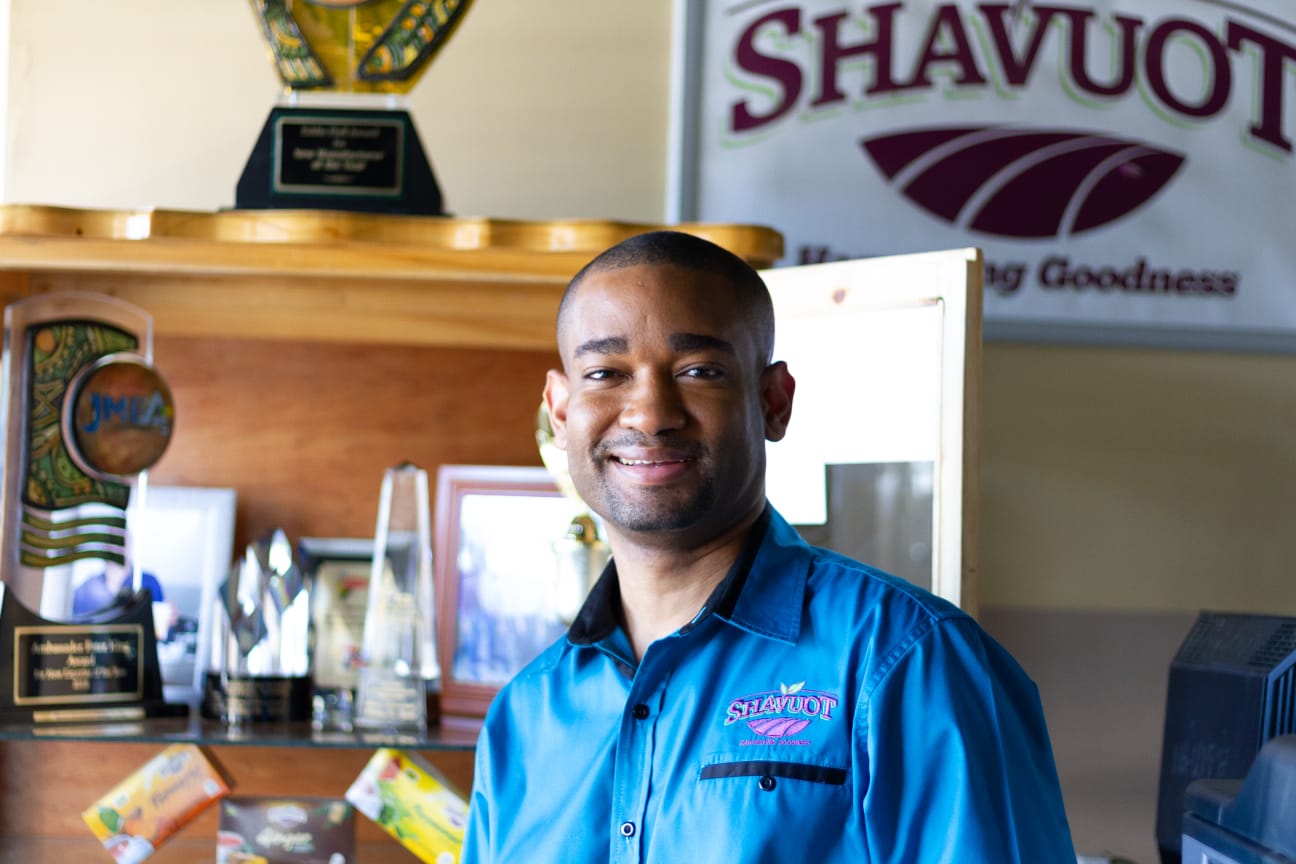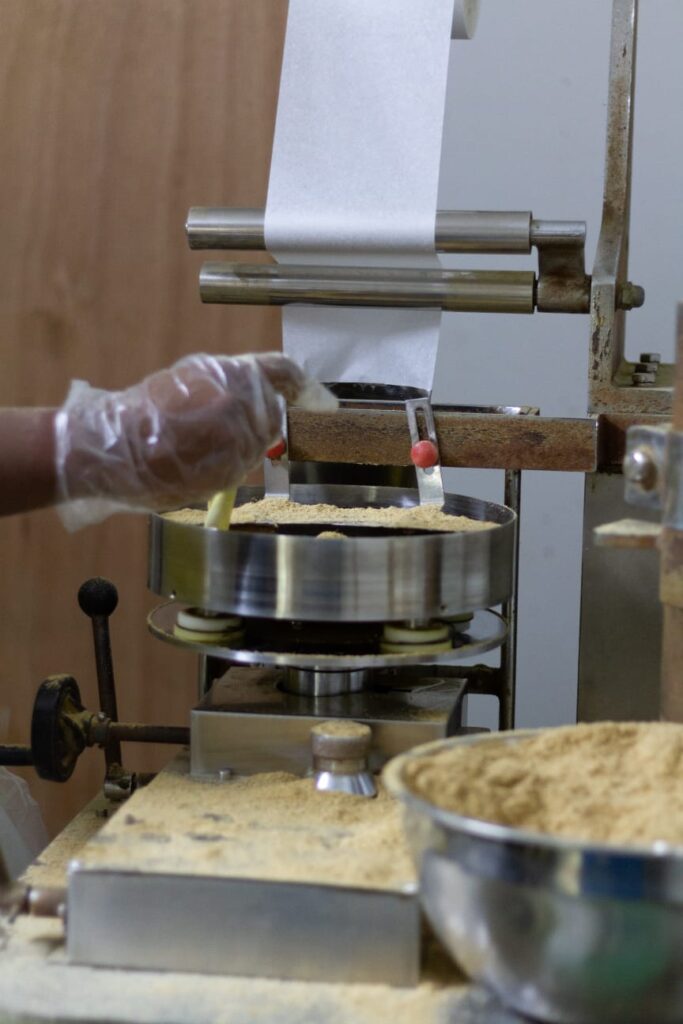
04 Oct An Agro Processing Success Story: Shavuot International Jamaica
How are farmers in the Caribbean fighting lost income and food insecurity? In Jamaica, Shavuot International is leading the way. The business has evolved into a vertically integrated family-owned group of companies taking raw produce to value-added products. With a supporting network of local farmers, Shavuot is “harvesting goodness” to supply local and international markets.
Shavuot International comprises Shavuot Farms, the original entity, and Shavuot Foods. Founder, Joel Harris, a marketing and management graduate of the University of the West Indies had developed an interest in agriculture after an internship with Jamaica Promotions Corporation (JAMPRO) and later gained experience with what he described as many “failed” startups that taught him valuable lessons.
In 2013, when his father, Richard Harris suggested they start a farm, it seemed feasible, especially since the government was offering low lease lands to incentivize farming and boost “eat what you grow” initiatives for the country. Joel’s father also proposed the name Shavuot, which in Jewish tradition was originally a harvest festival. They started Shavuot Farms on 165 acres of leased land spanning adjoining areas St. Catherine and Clarendon parishes.
From farming to agro processing
But neither Joel nor Richard had ever run a farm and like many Caribbean growers they were soon faced with theft and gluts in the market resulting in wastage and ultimately, lost income. Luckily, Richard leaned on his more than 30 years’ experience in operations management and running special projects and quickly suggested a slight pivot to using their produce as inputs for new value-added products.
By 2014, they had created the new company, Shavuot International and outsourced to a contract manufacturer in May Pen, Clarendon to create their first product samples: Shavuot moringa tea, soursop tea, moringa/soursop tea and Jamaican black castor oil.
That same year, Shavuot Farms was invited to exhibit with the Rural Agricultural Development Authority (RADA) at the annual expo held by the then Jamaica Manufacturers’ Association (JMA) and the Jamaica Exporters’ Association (JEA), now merged as the JMEA, Jamaica Manufacturers’ and Exporters’ Association. They included their new product samples in the exhibit and got immediate interest from attendees from the U.S. and U.K. markets. At a later expo in London held by the Fresh Produce Consortium, the reception was similar.
Today, Shavuot boasts over 25,000 square feet of agro processing space across two factories and exports to 15 countries. The group has also received several national awards and now exports over 90 percent of what it produces.

Small steps to progress
But Joel is careful to illustrate that many small steps, partnerships and relationships led to these achievements. He recalls the tiny 10 feet wide by 10 feet long room where they placed their first packing machine. It was located in a building used by a Christian outreach ministry, which provides skills training for at-risk youth. The two organisations entered a partnership in which Shavuot trained two of the young people in machine-operating skills in exchange for use of the room. Those two young people became the first employees of Shavuot Foods. That number grew to 50 and eventually Shavuot took over the almost 10,000 square foot building. Over 90 per cent of the inner-city facility is now staffed by people from the surrounding communities.
The business then started drying its own tea leaves, a function which RADA was doing for them in the earlier stages. By 2018, through a referral from a friend, Shavuot was encouraged by Jamaica-born philanthropist and founder of Trees that Feed Foundation, Mary McLaughlin, to produce breadfruit flour. She facilitated their training in its production and bought the machines to get them started. Under Shavuot Foods, they now manufacture Shavuot-branded breadfruit and sweet potato flours and Gold Seal Cassava Flour for manufacturing and distribution Group, SEPROD.
Food and nutrition security
Joel explains that a focus on quality food to ensure good nutrition, safe production and good taste has been a hallmark for Shavuot. They are SQF (safe, quality, food) certified and OU Kosher certified, in keeping the origin of the Shavuot name. Their extended network of farmers not only supplements production by Shavuot Farm but also ensures that each crop is grown in the most favourable topographic and soil conditions for the best quality and taste.
While their products are popular substitutes for imported alternatives, he also sees them contributing to food security in Jamaica in other ways. For example, farmers can now diversify their income, having Shavuot as a major buyer for their produce, in addition to being able to sell surplus in local markets. This income stream boost is not only good for farmers’ households but could mean they are able to sell their surplus to the end consumer at lower prices, enabling more families more affordable access.
Advice for success
Shavuot International stands as a useful model for Caribbean farmers and farmers’ cooperatives to study. Joel advises Caribbean farmers interested in having similar success to be willing to learn, work with local agencies and understand the unique strengths of their countries’ topography and soil.

